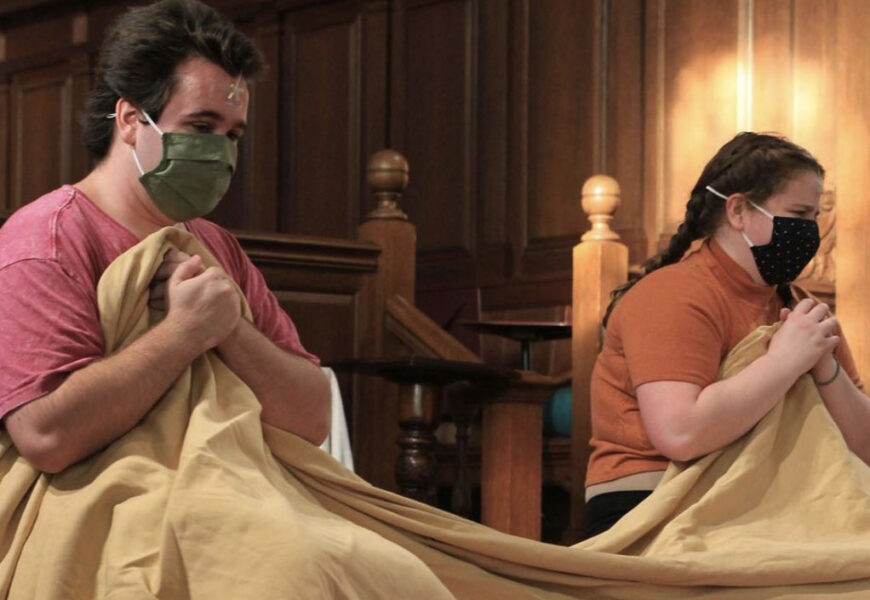Photo Courtesy of @conncolltheater.
“This show is very weird. It’s charming but it’s weird,” comments actress Martha Kenyon ‘21 of the theater department’s production of Love & Information. The british play, by Caryl Churchill, features fifty-seven unrelated scenes that span in theme from the chattering of childhood playmates to the sermon of a frightening priest. Performances took place this past weekend inside the campus chapel, with actors constantly shifting location: one minute singing from the transept ahead of viewers, the next holding an argument in the nave at their backs. Imagine that “the audience is looking into the windows of an apartment building,” describes Lena Rathgeber ‘24 of the work: “and seeing different scenes play out across each room.”
As a result of the piece’s non-sequitous nature, actors have had to pick up quite the assortment of parts. “Some of my characters include a distressed wife, a Harry Styles fangirl, a savant, and a game show host,” explains Sawyer Choudary ‘22. “What’s especially fun about these roles is that they allow me to explore my range as an actor instead of simply sticking to what feels safe.”
And what ‘feels safe’ to many at the moment: is no theater at all. The ability to put on two separate productions this semester, strictly following all Covid guidelines, was quite the feat for Conn’s theater department. “Live theater outside of Conn has become an absolute rarity,” Choudary points out. “Every time we perform, I’m reminded of the special circumstances under which we are allowed to do this, as we are the exception and not the norm.”
For Issue 4, I had the opportunity to speak with members of the production of 7/25, where many agreed that social distancing proved itself to be an interesting barrier in the theatrical world—a place that thrives on connection and proximity. The same held true for Love & Information. “We have to portray emotions, typically displayed through close contact, from far away,” describes performer Kate Rubel ‘24. “This is a challenge for actors.”
However she also admits that such challenges aren’t always inherently negative: that sometimes they push us to find the good in even the most gloomy of situations. “There are still so many things we can be thankful for, take advantage of, and experience,” she proposes. “Even though it [the pandemic] might feel never-ending at times.”
But even with that positive outlook, the Love & Information cast still held onto a few grounded concerns. A week before performances were set to begin, Conn suffered a second spike of Coronavirus cases—the same cases that clipped short Wig and Candle’s production of Sure Thing the weekend before. “We were in rehearsal when the campus alert changed from green to yellow,” Lena Rathgeber ‘24 reveals, while Martha Kenyon ‘21 admits: “I was scared we would have to move the performance to Zoom, which, though possible and we’d prepared for the scenario—didn’t sound fun.”
In some ways, the play’s unique nature reflects this uncertainty. First debuting in 2012 at London’s Royal Court Theater, Love & Information mirrors the idea that the unprecedented social and political climate of 2020 has required individuals to adapt to living in a constantly changing world. Though the audience is at first caught off guard by the quickly-alternating scenes, characters, and stage locations, they soon find themselves having to settle into that chaos, to abandon their attempts at grasping a bigger picture, and focus instead on the bits and pieces that make up the play.
As Conn students, we find ourselves doing the same: trying to lock our mindsets in the present, in the days and minutes of on-campus life—ignoring for the moment the long hometown-bound months that await us.
“The script is open to interpretation,” concludes Elyce Afrifa ‘22, believing that, though Love & Information borrows from aspects of its author’s life, today’s viewers can take a closer look and still find inside it links to the pandemic and to politics, making the piece relevant again through their own translation of it.•










